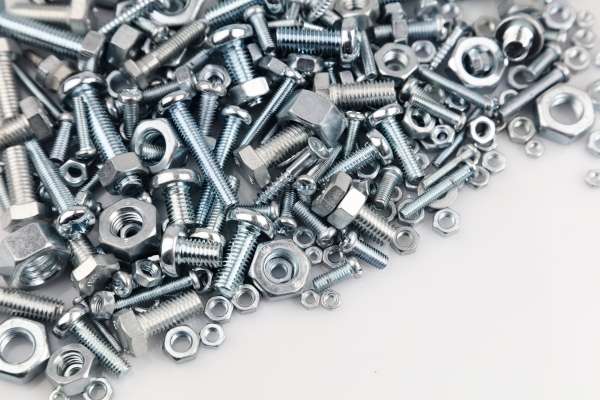
Jun 27,2023
Regarding construction, manufacturing, or DIY projects, fasteners play a crucial role in holding things together. From screws and bolts to nails and rivets, understanding the different types of fasteners is essential for successful and secure assembly. This comprehensive guide will explore the most common fasteners used across various industries, their characteristics, applications, and tips for choosing the suitable fastener for your needs.
Screws are widely used in various applications, providing secure fastening and easy disassembly. They come in multiple types, including wood screws, machine screws, and self-tapping screws, each designed for specific materials and purposes.
Wood screws feature sharp threads and a pointed tip, making them ideal for fastening wood materials. Their coarse threads provide excellent grip and prevent loosening over time, ensuring the longevity and stability of wooden structures.
Machine screws are designed to secure metal parts together, typically used in machinery and equipment assembly. They have finer threads, allowing for tighter and more precise fastening. Machine screws require a nut or threaded hole to provide a secure connection.
Self-tapping screws have a sharp, self-drilling point that eliminates the need for pre-drilling holes. They are commonly used in metal-to-metal or metal-to-plastic applications, creating their threads as they are driven into the material.
Bolts are heavy-duty fasteners known for their strength and reliability. They consist of a threaded shaft with a head at one end and require a nut to secure the joint. Bolts are available in various types, such as hex, carriage, and anchor bolts, each suitable for specific applications.
Hex bolts, also known as hexagon head bolts, feature a six-sided head and threaded shaft. They provide robust fastening and are commonly used in construction, machinery, and automotive applications.
Carriage bolts are recognizable by their round, smooth heads and square necks. They are often used in applications where the bolt's appearance is important, such as furniture assembly and exterior structures.
Anchor bolts are designed to secure structures to concrete or masonry. They have an L-shaped or J-shaped hook at one end and are embedded into the material during installation, providing a strong and reliable anchor point.
Nails have been used for centuries and remain popular for fastening wood, drywall, and other materials. They are available in various sizes and types, including common nails, finish nails, and brad nails, each suitable for specific applications.
Common nails, or framing nails, are the standard choice for general construction purposes. They have a thick shank and a flat head, providing excellent strength and stability for structural applications.
Finish nails have a smaller diameter and a tapered point, allowing for concealed and neat fastening. They are often used in woodworking and carpentry, where appearance is crucial, as they leave minimal marks on the surface.
Brad nails are smaller than finish nails and are used for delicate and precise fastening tasks. They are commonly used in trim work, furniture assembly, and crafts, where a small and inconspicuous fastener is required.
Rivets are fasteners that create a permanent joint between two or more materials. They consist of a cylindrical shaft with a head at one end and require special installation tools. Rivets are commonly used in aerospace, automotive, and metalworking industries.
Solid rivets are the traditional type of rivets and provide robust and durable joints. They require heating and hammering to secure the joint, making them ideal for heavy-duty applications with exceptional strength.
Blind rivets, also known as pop rivets, are designed for applications with limited access to only one side of the joint. They are installed using a special rivet gun, which pulls the mandrel, creating a tight and secure connection on the blind side of the assembly.
Anchors are fasteners used to secure objects to hollow materials, such as drywall or concrete blocks. They provide stability and support by expanding or gripping the material from within.
Wall anchors, also called drywall anchors, provide a strong and secure attachment point in drywall. They expand when inserted, creating a firm grip and preventing the fastener from pulling out.
Concrete anchors are specifically designed for fastening objects to concrete or masonry surfaces. They provide exceptional strength and stability, ensuring the fastened objects remain secure.
Selecting the right fastener for your project involves considering several crucial factors. Remembering these aspects, you can ensure optimal performance and durability.
Different materials require specific fasteners to ensure a secure and long-lasting connection. Consider the material you are working with and choose a fastener that is compatible and appropriate for that material.
Determine the load-bearing requirements of your project to select fasteners capable of handling the anticipated weight and stress. Refer to load capacity charts and consult with experts if necessary.
Consider the environmental conditions your fasteners will be exposed to, such as moisture, temperature variations, or corrosive substances. Choose fasteners resistant to rust, corrosion, or degradation in specific environments.
Evaluate the ease of installation based on the available tools and equipment. Some fasteners require specialized tools, while others can be easily installed with common hand tools.
The right fastener is crucial for successful and secure assembly in various applications. Whether it's screws, bolts, nails, rivets, or anchors, each type of fastener has unique characteristics and ideal applications. By understanding the different types of fasteners and their specific uses, you can make informed decisions to ensure your projects' longevity, stability, and safety. Consider factors such as material compatibility, load-bearing capacity, and installation requirements when selecting the most suitable fastener for your specific needs.